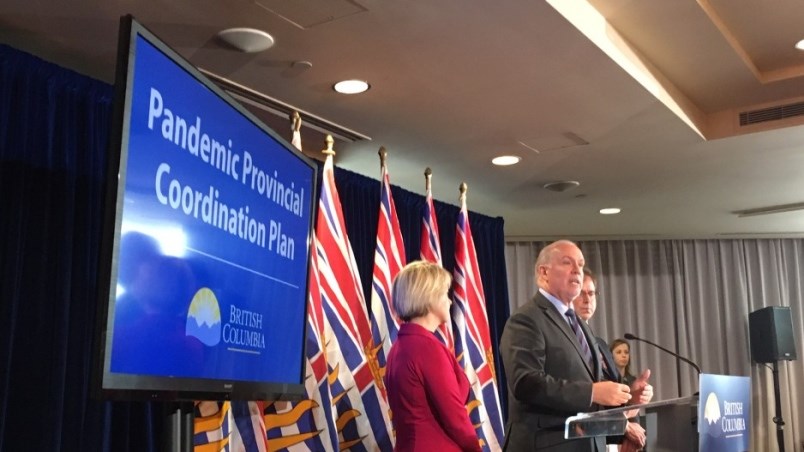Five research teams from the University of B.C. are getting $2.3 million in federal funds to help tackle the COVID-19 outbreak.
The teams will focus on developing and implementing measures to rapidly detect, neutralize, manage and reduce the transmission of the novel coronavirus. They join research teams that collectively received $2.8 million in federal funds earlier this month.
“We are very grateful for this additional investment through the federal government’s emergency research funding,” Gail Murphy, vice-president of research and innovation at UBC, said in a press release. “This provides researchers at UBC and across the country with resources to gain critical insights into COVID-19 and help to develop treatments and prevent its spread.”
Testing antibodies
One team, led by Horacio Bach, an adjunct professor in the division of infectious diseases in UBC’s faculty of medicine, is receiving $395,600 to develop antibodies that neutralize and block the entrance of the virus into cells and testing the efficacy of these antibodies in mice.
“Currently there is no effective treatment or vaccine to control the virus, which in severe cases can cause respiratory failure and death,” Bach said in a press release. “We are hopeful that our research will lead to a treatment for patients and will help prevent transmission of the virus that causes COVID-19.”
Anti-viral drug molecules
Another team, led by Artem Cherkasov, a professor in the department of urological sciences in the faculty of medicine, is receiving close to $1 million to look into rapidly identifying anti-viral drug molecules.
Using “deep docking” — a virtual screening protocol enabled by artificial intelligence — the research team is applying an algorithm to search chemical space to identify compounds that could potentially inhibit the main enzyme critical to helping the SARS-CoV-2 virus to survive. SARS-CoV-2 is the term for the virus that causes COVID-19 disease.
“Deep docking allows our team [to] rapidly identify small anti-viral drug molecules in an extremely condensed timeframe,” Cherkasov said. “In fact, our first application of the algorithm this month enabled the screening of 1.3 billion commercially available compounds against the novel coronavirus virus in one week — a process that would have taken three years using conventional methods.”
Preparing for the future
Another team, led by Eric Jan, professor in the department of biochemistry and molecular biology, and Chris Overall, professor in the Centre for Blood Research in the UBC faculty of medicine, is receiving $331,212 to work to identify ways to inhibit infection.
The team is working to identify protein targets of SARS and MERS coronavirus proteases. By engineering “decoy protein sequences,” the team is hoping to block the ability of the SARS and MERS coronaviruses to function, thereby inhibiting infection.
“Currently, pathogenic mechanisms that lead to COVID-19 diseases are not well understood,” Jan said. “We are hopeful that uncovering the proteins that are targeted by these coronaviruses will provide insights into the pathogenic mechanisms that lead to COVID-19 disease, which will hopefully help us prepare for future emerging coronavirus outbreaks as well.”
Genomic evolution
A team led by Jeffrey Joy, assistant professor in the UBC department of medicine, received $315,000 to study the genomic evolution of SARS-CoV-2.
Researchers will compare available SARS-COV-2 genomes and compare them to the genomes of other coronaviruses, looking for common features and evaluate patterns of viral spread in an effort to help focus the response and elimination of the current, and any future, coronavirus outbreaks.
The team is collaborating with researchers from the Chinese Centre for Disease Control and other Canadian researchers.
“We are grateful to the federal government for this emergency funding, which is enabling researchers at UBC and across Canada to help find solutions to this urgent crisis,” Joy said.
Repurposing blood pressure and diabetes drugs
Dr. James Russell, a professor in the UBC department of medicine, and his team are getting $255,970 to look at the safety and effectiveness of using drugs, called ARBs, commonly prescribed to treat high blood pressure and diabetes, to improve outcomes for patients with COVID-19.
Previous research has shown that these types of drugs can prevent lung injury in cases of influenza pneumonia. Russell and his team believe that they could work for patients with COVID-19 because influenza and coronavirus bind to the same cell receptor in the lung.
The study will include 497 hospitalized adults who are or are not already on ARBs.
“We hope that we can further increase understanding of whether a class of drugs very commonly used for cardiovascular disease and diabetes can actually help Canadians and patients around the world, get better outcomes from COVID-19,” said Russell.
The team also hopes to uncover answers as to why COVID-19 seems to critically affect elderly people and why heart disease seems to be a significant risk factor for dying from COVID-19.
@JessicaEKerr
Read more from the Vancouver Courier



